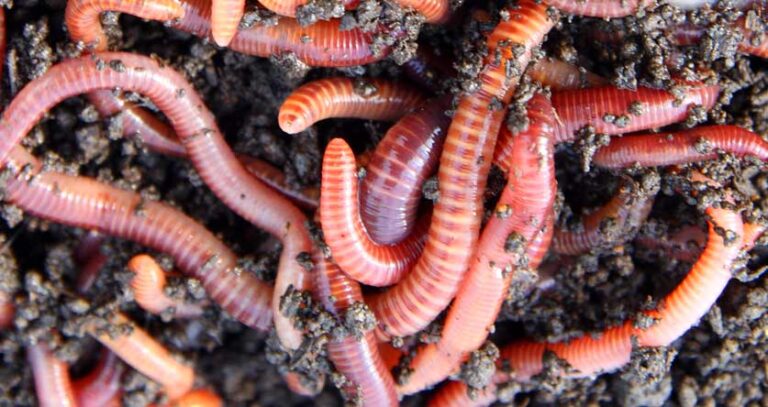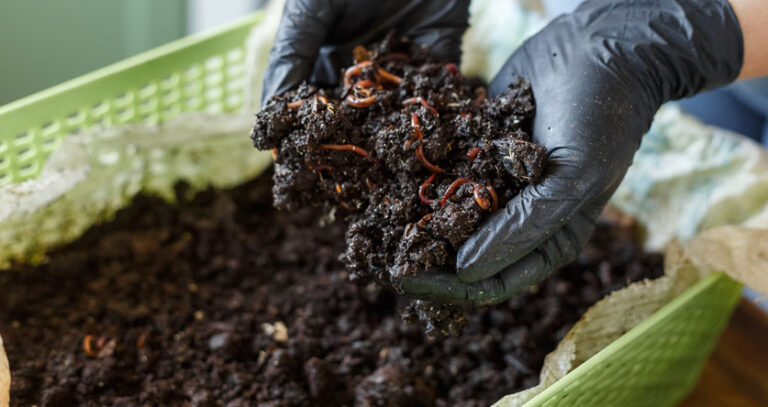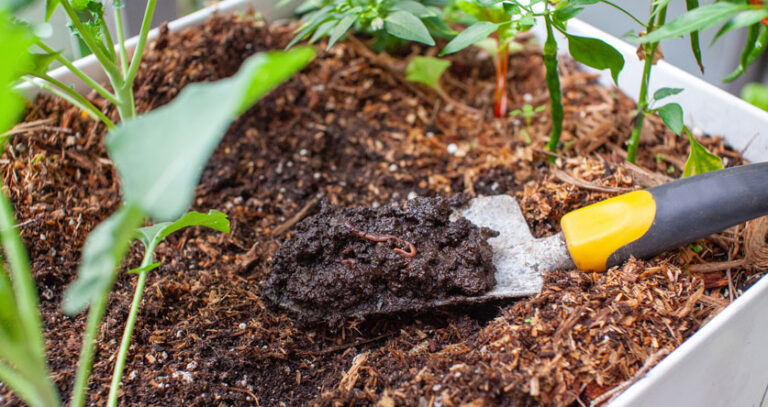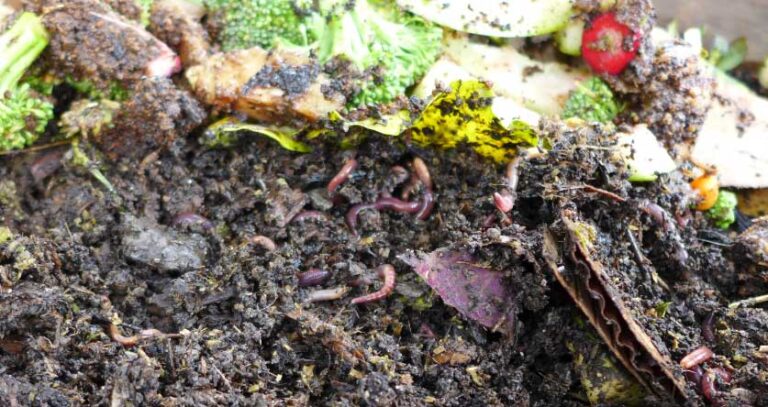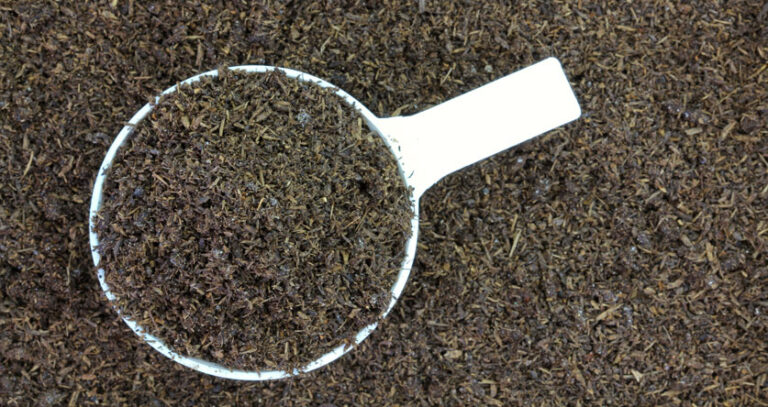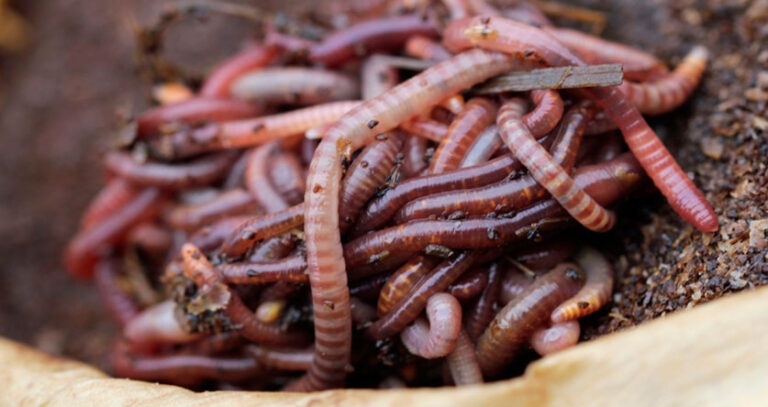How To Store Worm Castings (An Ideal Solution!)
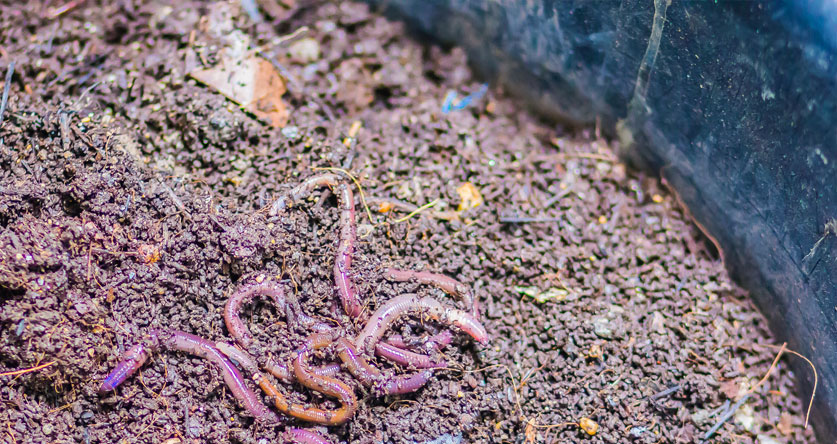
Having more worm castings than you know what to do with is a lucky problem! Thankfully, it is possible to store worm castings for later use.
But how you store your precious worm compost is vital.
Remember, those worm castings are not just packed with nutrients. They are full of life, beneficial bacteria, nematodes, protozoa, and fungi. These microscopic organisms require oxygen, moisture, and the right temperature to survive.
Worm castings are not as potent once these microbes have died, so you must store worm castings correctly to maintain the quality of your vermicompost.
How Do You Store Worm Castings?
Store worm castings in a cool, dry, dark place in 5-gallon buckets with holes drilled in the lid for airflow. To keep them moist, cover the surface of the worm castings with 3 or 4 sheets of wet newspaper. Keep the buckets where the temperature stays between 60 and 80°F (15 to 26°C).
Storing worm castings in this way ensures that the maximum number of microorganisms stay alive. While worm castings are in storage, you want them to lose as little moisture as possible, have sufficient airflow for oxygen, and not be exposed to UV light.
If worm castings dry out completely, they lose most of the beneficial bacteria and other microbes. Unfortunately, once they have lost their moisture, you cannot re-wet them and revive the little critters.
The same is true if the worm compost is exposed to sunlight or light from a grow light. The radiation kills the microorganisms permanently.
Extreme heat and freezing cold temperatures will also harm the microbial populations in worm compost. It’s okay if they get a little cold and become less active, but they should never freeze.
Can You Store Worm Castings For Later Use?
If you need to harvest the castings from your worm bin but don’t have anything to use them for yet, it is possible to store your worm castings for later use.
However, they will lose their freshness and some beneficial properties while you wait to use them. Therefore, it is key to store them correctly and take steps to keep them fresh.
Here’s how…
How To Keep Worm Castings Fresh
Worm castings are most beneficial for the soil and plants when fresh out of the worm bin. They will lose some freshness in storage, but it is possible to keep them relatively fresh for later use.
As you’ve probably figured out by now, the main thing that causes worm castings to lose their freshness is moisture loss. Wet newspaper is ideal for mitigating the loss of water content. But you must check the moisture of the newspaper every week.
If you feel it has dried out, use a spray bottle filled with water to re-wet the paper layers. Put the lid back on the bucket once you’re done.
Finished worm castings also need a small amount of air to keep them fresh.
The ideal container is a bucket with a well-fitting lid but with air holes drilled into the top, above the level of the castings. This prevents them from drying out too quickly but, at the same time, provides a small air supply.
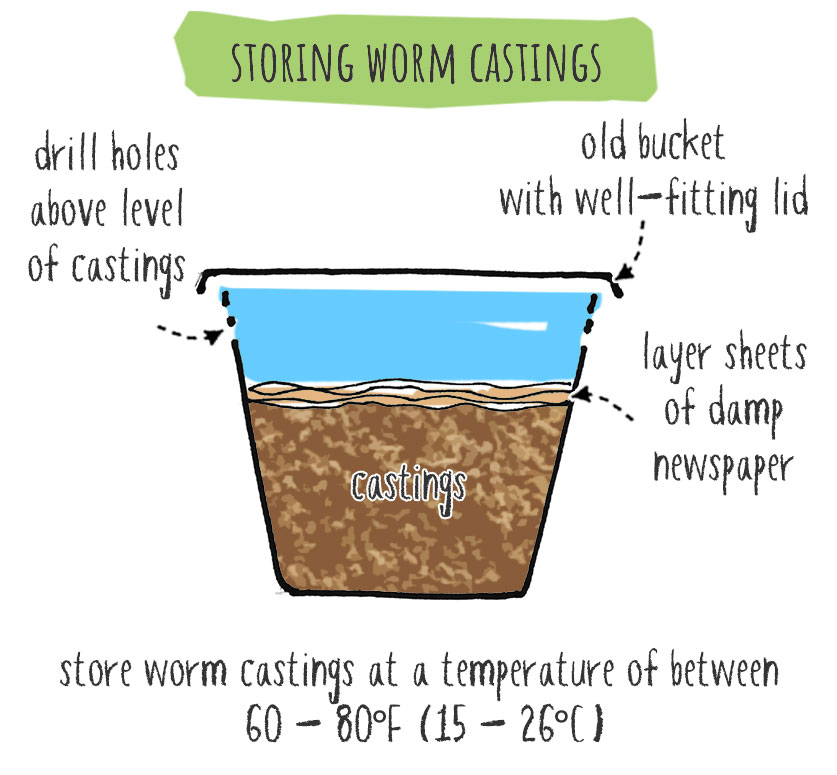
How Long Do Worm Castings Last?
Unfortunately, worm castings cannot be stored for an indefinite timespan. But then again, why would you want to? After all, you want to get that goodness into your soil!
Most people store their worm castings for a month or two before using them. Then, the worm compost won’t lose much of its freshness in eight weeks, especially if you store it correctly.
Some people find that they can store their worm castings for six months or even up to a year. This is possible, but to prevent them from losing all their goodness, be very careful how you store and maintain them while in storage.
Do Worm Castings Go Bad?
What happens to worm castings once they exceed their shelf life? Do they go bad?
Well, the answer is not 100% straightforward. It depends on what you consider “bad.”
Like a forest floor or healthy garden soil, fresh worm castings have a pleasant, earthy odor. They smell this way because the dominant bacteria in the worm castings are aerobic.
Aerobic means that they breathe oxygen, just like us. This is how they get their energy.
However, if worm castings are stored without enough airflow, the aerobic bacteria will be starved of oxygen and die. Anaerobic bacteria will then begin to dominate.
Anaerobic bacteria get their energy by fermenting amino acids and carbohydrates. This process creates sulfurous gasses that smell like rotten eggs.
Stinky worm castings might be considered bad, especially if you intend to use them on your indoor plants.
Nonetheless, even “bad” worm castings without aerobic bacteria still contain a lot of goodness and can benefit the soil and plants. In this sense, worm castings do not really go “bad.” They just go smelly.
But what if worm castings dry out completely? Does this cause them to go bad?
Are Worm Castings Still Good If They Dry Out?
Worm castings can dry out pretty quickly, especially if the air has little humidity and the weather is hot. But are they useless once they dry out? Certainly not.
Worm castings that have dried out completely do not contain any living organisms. A lot of the benefits of worm castings for plants and soil are from the living microbes they contain.
However, worm castings contain a lot more than just beneficial microbes. They also include a range of minerals that plants need to thrive.
Dried-out worm castings are still rich in nitrogen, phosphorus, potassium, magnesium, calcium, manganese, iron, carbon, zinc, cobalt, borax, and copper. These are essential for healthy plant growth.
Therefore, plants can still benefit from dry worm castings. They just don’t get the full benefits from the beneficial microbes.
Dried-out worm castings are still great for the soil too. They help to improve the structure of the earth, increasing its porosity, drainage, and water-holding capacity.
Can You Dry And Store Worm Castings?
Because worm castings are still good after they dry out, it’s possible to dry and store your leftover worm castings for later use.
I would not recommend drying out ALL your fresh worm castings to store them. This partially defeats the purpose of making worm compost.
But if you have spread worm castings around all your plants and still have some left, you can dry them and store them, so they do not go to waste.
FAQs
How Long Do Worm Castings Last In Soil?
Worm castings only last for a short time in soil. This is because they break down as they release their nutrients and become incorporated into the ground. Depending on environmental conditions, they can take between 20 to 25 days to break down entirely. That is why it is recommended to give plants worm castings once a month.
What Can You Do With Old Worm Castings?
Worm castings are most beneficial for plants when they are freshest, but that does not mean that old worm castings are useless!
There are still plenty of things you can do with what most people consider “expired” worm castings:
- Add it to your potting mixture,
- Sprinkle it around plants,
- Use it when you transplant seedlings
- Mix it with your regular compost to build new garden beds.
How Do You Store Worm Tea?
Unfortunately, worm tea cannot be stored for more than 24 hours, so it is best to use it as soon as it is ready. To store it short-term, keep worm tea in a bucket without a lid on and give it a stir to aerate it every few hours.


